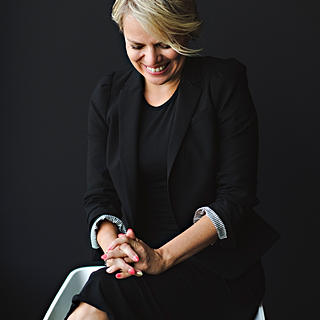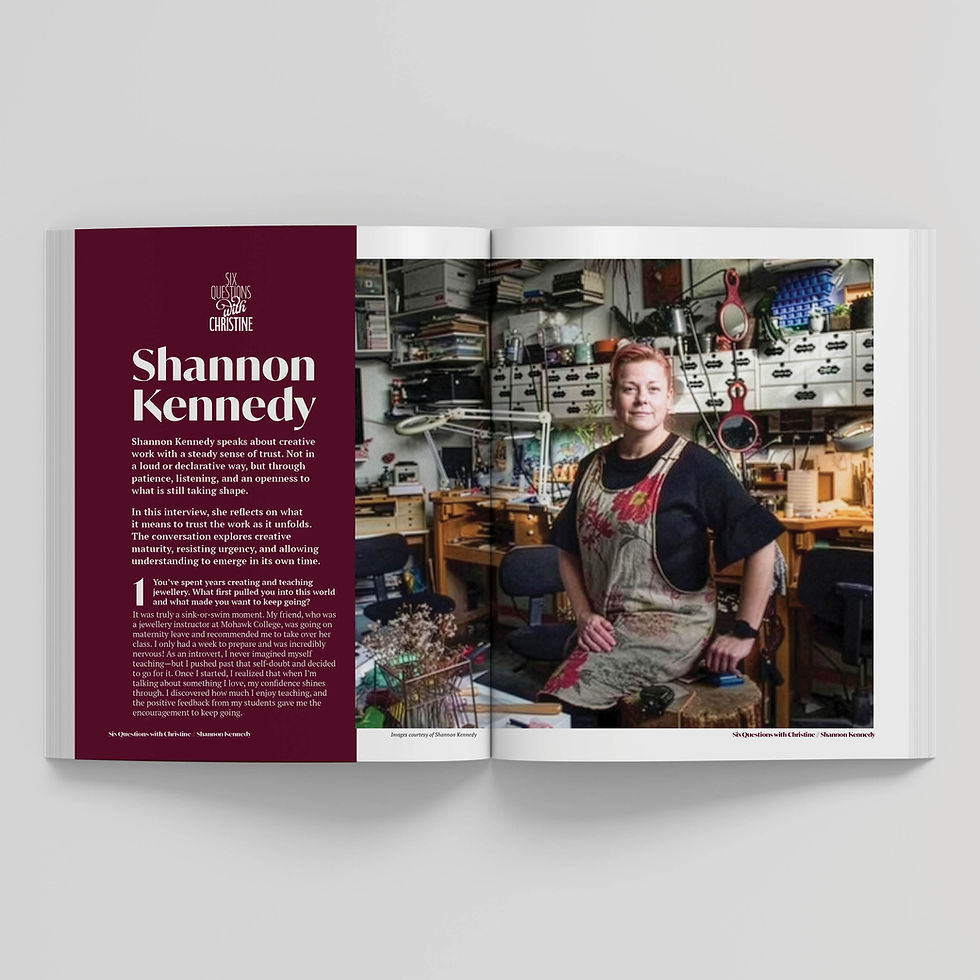From a Basement Startup to a Household Name: 6Qs with Christine featuring Trish Mumby
- cgoucher
- Mar 10, 2025
- 6 min read
Updated: Aug 31, 2025
Mabel’s Labels started as a small idea among four moms who saw a gap in the market. It grew into a household name, was acquired by a global company, and is now celebrating its 22nd year (fun fact: I was the original designer of Mabel!).
One of the incredible women behind that success is Trish Mumby, entrepreneur, mentor, and someone who believes that creative people need to be around other creatives and embrace random adventures to thrive. She’s done just that, taking Mabel’s Labels from a basement startup to an acquisition, leading the company through major transitions, and now mentoring early-stage founders on building brands that stand out in a noisy world.
In this 6Qs with Christine interview, Trish shares:
The moment she knew Mabel’s Labels was something big
The biggest challenges new entrepreneurs face today
Why she believes in just launching instead of over-planning
Her latest solo adventure (hint: it involves Tanzania)
Trish’s insights are bold, honest, and packed with wisdom, plus she dressed up as a quitter for Halloween when she left corporate life, which is pretty iconic.
Here’s what she had to say:
When you and the team started Mabel’s Labels, what was the moment you knew you had something special?
There were so many pivotal points such as hiring strangers, getting press, etc. but the "something special/something sustainable" moment was definitely when we were featured in a big U.S. blog we had never heard of, called The Daily Candy. We received so many orders, we assumed our website had a virus! Up until then we were getting steady love from friends, family, local & Canadian press, what I call: two degrees of separation, type "fame". But when the now defunct Daily Candy featured us, it was life changing. We received orders from parts of the U.S. we had never heard of. We received orders from celebrities like Elizabeth Hasselbeck and Brooke Sheilds. Word of mouth from those orders caused more orders. The Daily Candy is what made us realize we had to quit our day jobs. This was no longer a side hustle. We didn't see it coming, we hadn't intended for it to get so big, it was purely organic because of what we had created: a product that truly lived up to its promises and made life easier for Moms. If you actually make a woman's life better, you can be sure she'll spread the word.
You took Mabel’s Labels from a basement startup to a huge success. Looking back, what do you think made the biggest difference in growing the business?
There were a few factors. One is that we were first to market with a product that was affordable and effective. We also benefited from the power of partnership. Most business gurus will tell you that a partnership of 4 equal partners is a terrible idea, but we made it work and it helped us move faster than most consumer facing start-ups we were meeting along the way. While we had no business experience or education, we were shameless about asking for help and advice. We sought mentorship and built friendships with the women entrepreneur community; we didn't build in isolation. We faced what we didn't know head-on. We were very proud of what we built and therefore, very protective; we were aggressive with product development, public relations, guerrilla marketing and experimentation because we always wanted to lead, not follow.
After the company was acquired, your role shifted in big ways. What was that transition like, and what did you learn from it?
From the initial contact, to close of the deal, I quietly exited the day-to-day operation of the business to focus on the acquisition. Near the end, they told us that one of us needed to stay on as the General Manager of the business. Because I fronted the acquisition, the buyers knew me best and I took that role on. It was weird being a
solo-leader suddenly. It's not for everyone and I'm not sure it was for me. In my history with Mabel's Labels I typically took on the creative roles in marketing, product development and "tinkering". Putting me in a leadership role where I spent most of my time in spreadsheets and meetings was not the right fit. I was often miserable, usually at month end, quarter end, year, audit season, and other fun corporate calendar prisons. It was amazing to be purchased by the world's largest label company and the job came with many perks, but I missed the war rooms during disasters, combing tastemaker sites for the next big trends, and just playing with the other creative people in the company to "wander idea-land". I lasted nearly four years, but trying to get the company through the first Covid non camp season & non back to school, was the nail in my corporate coffin. My last day was Halloween 2020 and I dressed up as a quitter.
Now that you’re mentoring up-and-coming entrepreneurs, what’s the most common challenge you see, and what advice do you always give?
Everyone, and I mean everyone, wants to make a Powerpoint and hit the funding circuit immediately! It's the culture right now, in the incubator start-up systems. I think every founder needs some dirt under their nails before they are ready for investment. You need to prove you have what it takes for people to trust you. Investors choose people over ideas, every time. The best ideas can die on the vine , so easily. Outside of the incubator ecosystem, the other common challenge founders have is creating a strong brand. It's incredibly easy to start a business right now. The world is very noisy. Simply existing is not enough. Founders struggle to put their whole heart and reputation on the line to stand proud & loud behind their brand and story; to make the necessary noise. Successful start-ups need memorable brand elements, perfect SEO set-up, well crafted, human stories, and a strong founder presence. Entrepreneurship is not for the shy or quiet. If that's you, get comfortable with faking LOUD & PROUD.
What’s something you’ve done lately that scared you, but you went for it anyway?
Well, as I type this I am in Tanzania alone, and I've been here for over a month. I spent 2 weeks volunteering with a sustainable tourism group through an NGO, but I've spent 3 weeks just wandering around. I have definitely had moments of "what am I doing?". I've been stranded on the roadside by taxis with flat tires. I texted "If I don't send a text in 30 minutes, call the embassy" when I was scared (I had no real reason to be afraid...it was a moment of weakness). I have overwhelming moments of fear over being so far from my adult daughter. I sometimes think I'm crazy! I often travel alone, but this is my third time travelling very far for a month. It's challenging and wonderful. I am happy to report, I enjoy my own company immensely; that is a gift. I want to see the world and do weird things, so why wait for someone that wants to join? I am very good at starting up new friendships while I travel and I'm proud of that. I am delighted to travel with friends, I LOVE my friends, but I'm happy that I can do hard things on my own.
What’s lighting you up right now, whether in your work, mentoring, or life in general?
I love watching my 20year old daughter enjoy University as much as she does. I loved my time at UW (too much, in fact, to be an academic weapon), and I had hoped the same for her. She was in high school during Covid and it was miserable. She is a the University of Guelph, Lang School of Business and THRIVING. Ironically, the Lang Family is the primary shareholder of CCL Industries, the company that bought Mabel's Labels. I also love working with the hundreds of young start-up founders I meet every week through the accelerators I work with. I love their energy and optimism. It reinforces that I only ever want to work with entrepreneurs. Corporate soldiers are wonderful, dedicated people that I will never understand. Marching toward a pension vs. a dream - no thank you.
Bonus Question: You’ve worked with so many incredible people over the years, whether in business, marketing, or mentoring. What’s the best piece of business advice you’ve ever received (or given)?
...ahhh The best pieces of advice were all about people. Being an employer is one of the hardest things you'll ever do. - don't force-fit skills: If someone is an amazing programmer; the best you have, it doesn't mean they should be promoted & promoted until they're sitting in managerial misery. - horses for courses: The most important people in your start-up phase will become family. You will literally love them. But they may not be the right people for growth phases or sustainability phases. Knowing when the company has outgrown people or vice versa and facing it is essential and difficult. My best piece of advice that I find myself giving these days is: JUST LAUNCH. TEST. TRY. Young entrepreneurs have grown up in a world where every move is recorded, splashed around on social media and harshly critiqued. It has made them shy to LAUNCH and see what happens, Test | Learn | Try again. I get it, but that is not entrepreneurial spirit. Make your moves or someone else will.
Know someone with a creative spark?
I’m always looking for inspiring people to feature in 6Qs with Christine. If you know a creative thinker, maker, or storyteller whose journey deserves a spotlight, send me a note! I’d love to hear from you.










